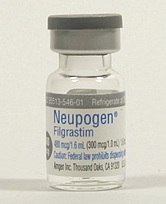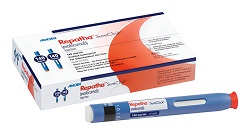Amgen ($AMGN) has been edging toward a Big Pharma qualification for some time--not only with annual revenues that last year surpassed Eli Lilly & Co. ($LLY) and Bristol-Myers Squibb ($BMY), but with investor-friendly trappings like dividends, buybacks and billion-dollar cost cuts.
It's even branched into branded generics--and more recently, heard calls for a break-up, a la Pfizer ($PFE), Johnson & Johnson ($JNJ), and, as of last month, GlaxoSmithKline ($GSK).
Now, Amgen is set to compete with Big Pharma deal scouts for M&A in the $10 billion range. As the Financial Times reports, the Thousand Oaks, CA-based company has been shopping for companies with products on the verge of winning regulatory approval, and it's preparing the ground with its own shareholders for a sizable buyout.
 The deal hunt comes as Amgen contends with biosimilar competition for the first time--and faces more biosimilars coming up through rival drugmakers' pipelines. Novartis' ($NVS) Sandoz unit recently launched Zarxio, its knockoff version of Amgen's $1.2 billion Neupogen, and Sandoz is now awaiting FDA review on its Enbrel biosimilar. The anti-inflammatory drug brought in $4.7 billion for Amgen last year.
The deal hunt comes as Amgen contends with biosimilar competition for the first time--and faces more biosimilars coming up through rival drugmakers' pipelines. Novartis' ($NVS) Sandoz unit recently launched Zarxio, its knockoff version of Amgen's $1.2 billion Neupogen, and Sandoz is now awaiting FDA review on its Enbrel biosimilar. The anti-inflammatory drug brought in $4.7 billion for Amgen last year.
So far, so much like Big Pharma, which has been snapping up drug developers left and right as top blockbusters fell victim to generic competition. Most major drugmakers have seen the worst of their patent expirations by now--though AstraZeneca ($AZN) faces loss of Crestor exclusivity next year--but most are still trying to recover, too.
 Also like Big Pharma, Amgen has been lining up new meds to fill future sales gaps, including the PCSK9 cholesterol fighter Repatha approved in August and its brand-new cancer vaccine Imlygic, cleared by the FDA last week. But it will have to keep those launches coming as more biosims hit, and buying in a product or two could help.
Also like Big Pharma, Amgen has been lining up new meds to fill future sales gaps, including the PCSK9 cholesterol fighter Repatha approved in August and its brand-new cancer vaccine Imlygic, cleared by the FDA last week. But it will have to keep those launches coming as more biosims hit, and buying in a product or two could help.
Amgen had been focusing on early-stage deals, but now it's "opening the aperture a little bit," EVP Tony Hooper said during the company's third-quarter earnings call. It's "beginning to look at a broader range of things" partly because prices are coming down.
 |
| Amgen's Tony Hooper |
"We think obviously that the valuations in the sector are probably more favorable now for the later-stage assets than they were a year ago," Hooper said, though he pointed out that it could be awhile before asking prices decline as much as biopharma stocks have.
It wouldn't be Amgen's first deal in the $10 billion range; the company bought Onyx Pharmaceuticals and its multiple myeloma med Kyprolis in 2013 for a similar sum. At first, that deal looked as if it might not pay off as expected, as Celgene's ($CELG) head-to-head rival, Pomalyst, quickly captured market share. But Kyprolis has rallied in recent quarters, partly because of a new approval for use earlier in the disease.
But Amgen obviously wouldn't be the first to eye deals of that size, either. Bigger drugmakers have been scouring the landscape for companies that would bring new products into less-than-full pipelines. Sanofi ($SNY), for instance, last week says it's looking around for sizable bolt-on deals, up to the size of its $20 billion Genzyme buyout in 2011.
- read the FT story
Special Reports: Top 15 pharma companies by 2014 revenue - Amgen | The top 10 advertisers in Big Pharma - Amgen